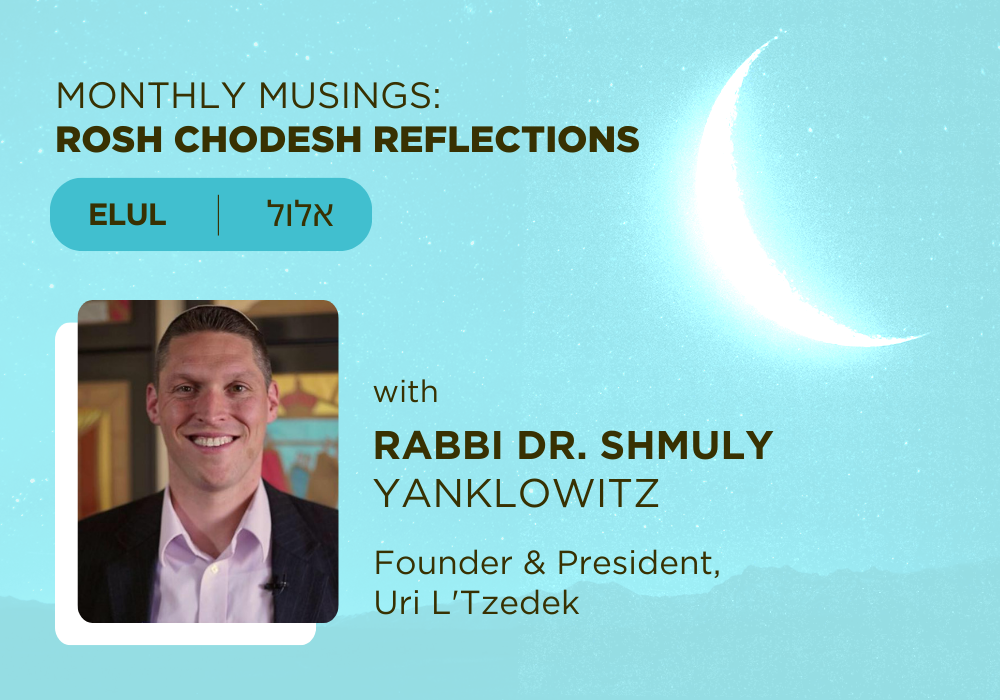Rosh Chodesh Reflections: Monthly Moments of Inspiration

Welcome to Rosh Chodesh Reflections: Monthly Moments of Inspiration, an OLAM blog series!
At the start of each month on the Hebrew calendar, we invite Jewish leaders from around the world to explore the intersection of global responsibility and Jewish values. Join us, and immerse yourself in the rich Jewish tradition of pursuing justice.
This month, Av, we hear from Rabbi Micha Odenheimer, journalist, social entrepreneur, and founder of OLAM partner Tevel b'Tzedek.
Q: Tevel B'Tzedek has done extensive work in Zambia. How have local partnerships played a role in the success of your projects there?
Micha: In our work in Zambia, local partnerships have played a key role, and we hope will continue to play an even greater role. Through partnerships we access expertise and cultural fluency, as well as resources. Our first partnership has been with a Zambian organization called Africa Access Water, which is dedicated to providing solar powered water for productive use. They have helped us in digging a dozen wells, both for drinking water and especially for agriculture. Africa Access Water has also helped us navigate the traditional community governance structures - the head men and women of the villages we work in, and also the chieftainess of the region.
The young adults from the villages are our second major partner. 26 of them are enrolled in our full-time two year Youth Service Program (YSP) and their participation allows us to penetrate deeply into all the corners of the community. They function as quasi-staff; soon we will be recruiting another cohort.
Our third partner is the Zambian government, on both the national and the district level. The Ministry of Youth has provided leadership training for our Youth Service Program and the Health Ministry has partnered with us in training community health volunteers who can test for malaria and provide medicine. We have had an especially close relationship with the District Agriculture Office, where one of the officers did a Masters at Rehovot Agriculture Faculty on a Pears Fellowship! They have provided us with numerous training and workshops for our community, as well as logistical aid in procuring seeds and other inputs. The University of Zambia has given us important help too: Starting this month, their poultry specialist will be spending three months on our farm helping to set up our village poultry project.
Finally, we are now hoping to significantly expand and replicate our model to other districts and regions by plugging into already existing government supported schemes. So for example, we are seeking to gain recognition as an official government skills center --we can then get funding for every young adult we train. The Ministry of Youth has offered to help us with that. And the Ministry of Green Economics wants to help us add carbon credits to our repertoire for communities. Zambia has been a great place for partnerships and orchestrating these various resources for the good of subsistence farming villagers can help make a big difference in many lives.
Q: How does your work in global humanitarian efforts align with Jewish values and principles?
Micha: If I had to sum up the main thrust of Judaism in one word, I would say “Indwelling”: Creating a world where God’s presence can fully and openly inhabit the world. This means recognizing God’s unity and thus the unity in all creation and the unity of humankind and all of life. The unity of humankind does not mean cultural or religious homogenization, but creating, with the great knowledge and abundance that God has given us, a home everyone, in which every culture and human being can rise to their potential and beyond.
That means first of all that people have enough healthy food and water, access to healthcare and to education, and the knowledge and ability to together and individually make decisions about their lives. Without these basics, the divine image cannot shine out from each individual in its full power. Moreover, without each of us individually and as a collective caring and actively ensuring that people have the basics that they need, our divine image, collectively and individually, cannot shine. In fact the Zohar says (in parshat Mishpatim) that when evil outweighs good on the heavenly scales, souls from the tree of life are sent into the wrong bodies and situations. The level of goodness and justice in the world is the responsibility of all of us and affects all of us. All the more so in a world in which we know we are deeply interconnected --ecologically, economically, politically and even spiritually. A concept called “Ochel Nephesh” --necessary nourishment--teaches us that the basic necessities should not be commercialized, at least not before they have been attained by everyone. Therefore we see the work of NGO’s as having a crucial place in the ecosystem of development. Relying on profit-hungry capitalism can help sometimes, but is very often destructive to the poor.
Tevel’s work in villages is meant to allow families and communities to reach a level beyond struggle for survival so that they grow and develop as individuals and as collectives. As a group whose religious revelation was given to us as a people, we believe very strongly in the power of community in human life. Ultimately our goal is a renewed and transformed humanity, in which we recognize our deep responsibility and connection to each other through a basic, self-evidently true set of ethical axioms shared by all of humankind.

.png)


